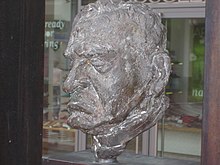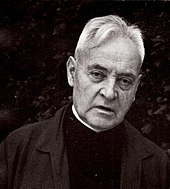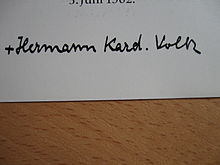Hermann Volk
Hermann Cardinal Volk (born December 27, 1903 in Groß-Steinheim , † July 1, 1988 in Mainz ) was Bishop of Mainz from 1962 to 1982 . Pope Paul VI elevated the Bishop of Mainz to cardinal on March 5, 1973 .
Life
Ordination and academic career
Hermann Volk was born on December 27, 1903 in Steinheim am Main (now a district of Hanau ). His older brother was Georg Volk . After graduating from high school, Hermann entered the Mainz seminary . On April 2, 1927, he received by Bishop Ludwig Maria Hugo the priesthood . He was then from May 1, 1927 to August 31, 1931 chaplain in Alzey and from September 1 of the same year to April 20, 1935 chaplain in Mainz in the parish of St. Ignaz . He was then released for further studies. For this purpose he stayed at the universities of Freiburg im Üechtland and Münster . On 12 October 1938 he was in Friborg to the doctor of philosophy doctorate . His dissertation dealt with the conception of creatures in Karl Barth . He then worked as a priestly assistant in Nidda until he received his doctorate in theology on September 18 at the University of Münster . After various temporary posts in Offenbach am Main and Gau-Odernheim , he became parish curator in Nidda on May 1, 1941 . On March 20, 1943 , he completed his habilitation under Michael Schmaus on Emil Brunner's doctrine of sin.
Professor in Munster
On August 11, 1946, he became a full professor of dogmatics at the Westphalian Wilhelms University in Münster . In addition to his teaching activities, he also helped out in parishes in the city center of Münster and in the university community. From 1954 to 1955 he was also the rector of the university. For his services as a university lecturer, he was appointed papal house prelate on February 25, 1956 . In his function as a professor of dogmatics, he was involved in the planning of the Second Vatican Council at an early stage . In 1960 he was therefore appointed as a consultor in the Secretariat for Christian Unity. From 1966 he was a member of this council.
Bishop of Mainz

On March 3, 1962, Hermann Volk was elected by the Mainz Cathedral Chapter to succeed Albert Stohr , who died on June 3, 1961 . Pope John XXIII confirmed the election on March 25, 1962 and named Hermann Volk as the 86th successor of St. Boniface in the Holy See of Mainz . The episcopal ordination took place on June 5th in Mainz Cathedral . The consecrator was the Freiburg Metropolitan , Archbishop Hermann Schäufele . Co-consecrators were the Bishop of Rottenburg , Carl Joseph Leiprecht , and the auxiliary bishop of Mainz Josef Maria Reuss .
In August of the same year, Volk became a member of the Faith Commission of the German Bishops' Conference , which he remained until 1982. From 1969 to 1978 he was also chairman of the commission. In September 1964 he also became a member of the Liturgy Commission (until March 1978), which he also served as chairman from 1964 to 1969. The work in this commission was particularly important, as the liturgical reforms decided by the Second Vatican Council were implemented at this time. He was also a member of the Ecumenical Commission from 1962 to 1982 and from March 1968 to May 1976 a member of the Commission for Science and Culture.
As Bishop of Mainz, Hermann Volk took part in the Second Vatican Council from 1962 to 1965. There he participated u. a. in the preparation of the Constitution Sacrosanctum Concilium for the Holy Liturgy. In so-called interventions in the plenary assembly of the council, he repeatedly took a stand on important issues. The Volks council diary is edited by Peter Walter and Leonhard Hell .
After the council, Volk, who had also been a member of the Congregation for the Doctrine of the Faith since 1968 , was involved as chairman of the liturgy commission of the German Bishops' Conference in the implementation of the liturgical reform decided by the council. In doing so, he was careful to find a healthy balance between the keepers and the renewers.
The Würzburg Synod , which took place from January 1971 to November 1975 and was supposed to implement the decisions of the council in Germany , also dealt with these and other questions . Hermann Volk was a member of Technical Commission I, which was supposed to deal with the “Faith and Proclamation”.
Because of his services to the implementation of the council, Pope Paul VI. on February 2, 1973 announced that he wanted to create the Bishop of Mainz as cardinal . He was the first cardinal since Albrecht von Brandenburg (1514–1545) on the Mainz bishopric and after this and Conrad I von Wittelsbach (1183–1200) only the third cardinal of Mainz at all. The ceremony for the appointment took place on March 5, 1973 in Rome, where the new cardinal of Pope Paul VI. the insignia of his new dignity were presented. As titular church to church, he was Santi Fabiano e Venanzio a Villa Fiorelli assigned.
A year earlier, Volk had made initial contact with the Polish Bishops' Conference and gave theological lectures to Polish professors there during a visit in the same year. On the occasion of this visit, he also met the then Archbishop of Kraków and later Pope Karol Wojtyla , who also visited Mainz in September 1978 as part of a return visit. The exchange between the Polish and German Bishops' Conferences was seen as an important signal of reconciliation between the nations after the devastation of World War II .
That same year on December 27, his 75th birthday, Volk submitted his resignation in accordance with the provisions of canon law. John Paul II did not accept the request and extended Volks's term of office by two years. In 1980, Volk therefore offered his resignation again, but John Paul II again refused to accept it. This time the term of office was extended indefinitely. It was not until 1982 that the Pope granted the petition because the people's health was now compromised. On December 27, 1982, the 20-year term of office of the 86th successor to Boniface ended.
Publications (selection)
- Emil Brunner's teaching about the sinner. Münster: Verlag Regensberg 1950.
- The new dogma of Mary. Content, reason, meaning. Münster: Verlag Regensberg 3rd edition 1956.
- Sunday service. Theological foundation. Münster: Verlag Regensberg 2nd edition 1958.
- The Christian understanding of death. Münster: Verlag Regensberg 2nd edition 1959.
- God lives and gives life. Münster: Verlag Regensberg 2nd edition 1959.
- World history as salvation history. In: K. Rudolf (Ed.), The Church and the Powers of the World. Vienna 1961, pp. 30–47.
- The sacrament of marriage. Münster: Verlag Regensberg 4th ed. 1962.
- You are a new creation. Reflecting on the Church, Council and Ecumenism. Freiburg i, Br .: Herder 1987
honors and awards
On December 5, 1964, Hermann Volk received the honorary citizenship of his hometown Steinheim am Main .
In 1975, in the year of the millennium anniversary of Mainz Cathedral , Hermann Volk was honored with honorary citizenship of the city of Mainz on June 3rd . Three years later he also received the Grand Cross per piis meritis of Merit Pro Merito Melitensi of the Sovereign Order of Malta and the Grand Cross of Merit of the Federal Republic of Germany , having already in 1973 the Federal Cross of Merit with Star and Sash had been awarded.
Individual evidence
- ↑ P. Walter, The Council as an event of successful or unsuccessful communication. Hopes and experiences of the Mainz bishops Wilhelm Emmanuel von Ketteler and Hermann Volk, in: Communication is possible. Theological, ecumenical and interreligious learning processes, ed. by Christine Büchner, Christine Jung, Bernhard Nitsche and Lucia Scherzberg (Festschrift for Bernd Jochen Hilberath), Ostfildern 2013, 58–77.
literature
- Peter Hilger: "Creativity". Hermann Kardinal Volk als theologe , in: Catholica , 44 (1990), pp. 147-168.
- Heribert Löbbert: Connection. The theology of Hermann Cardinal Volks. Frankfurt a. M. u. a. (1995), pp. 411-423.
- Karl Cardinal Lehmann / Peter Reifenberg (ed.): Witness of God's Word. Hermann Cardinal Volk . Matthias-Grünewald-Verlag, Mainz 2004, ISBN 3-7867-2552-7
Web links
- Literature by and about Hermann Volk in the catalog of the German National Library
- Works by and about Hermann Volk in the German Digital Library
- Entry on Hermann Volk on catholic-hierarchy.org
- Video: Sermon by Cardinal Volk at the episcopal ordination of his successor Karl Lehmann on October 2, 1983 in Mainz Cathedral
- Volk, Hermann. In: Salvador Miranda : The Cardinals of the Holy Roman Church. ( Florida International University website), accessed November 19, 2019.
| predecessor | Office | successor |
|---|---|---|
| Harry Westermann | Rector of the University of Münster 1954–1955 |
Hellmut Becher |
| Albert Stohr |
Bishop of Mainz 1962–1982 |
Karl Cardinal Lehmann |
| personal data | |
|---|---|
| SURNAME | Volk, Hermann |
| ALTERNATIVE NAMES | Volk, Hermann Cardinal |
| BRIEF DESCRIPTION | German clergyman, Bishop of Mainz (1962–1982) |
| DATE OF BIRTH | December 27, 1903 |
| PLACE OF BIRTH | Gross-Steinheim |
| DATE OF DEATH | July 1, 1988 |
| Place of death | Mainz |



